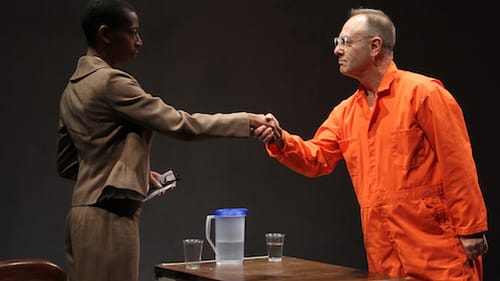Stay in the Loop
BSR publishes on a weekly schedule, with an email newsletter every Wednesday and Thursday morning. There’s no paywall, and subscribing is always free.
Truth, reconciliation, theater
EgoPo Classic Theater presents Nicholas Wright's 'A Human Being Died That Night'

EgoPo Classic Theater's South African season begins with A Human Being Died That Night, by South-Africa-born playwright Nicholas Wright. It’s a dramatization of psychologist Pumla Gobodo-Madikizela's award-winning nonfiction book about South Africa’s process of reconciliation.
After South Africa's apartheid policy ended in 1990, a Truth and Reconciliation Commission made public the former government’s many crimes. Gobodo-Madikizela served on the commission’s Human Rights Violation Committee. Nicholas Wright fashions her interviews with state-sanctioned convicted mass murderer Eugene De Kock, along with her commentary from her book, into a gripping stage conversation.
Police officer De Kock, nicknamed "Prime Evil," confessed to murdering hundreds of people and in 1996 received two life sentences plus 212 years.
Two people in a room
Steven Wright, who’s usually seen onstage as an actor in Philadelphia, directs EgoPo's intense production. Set, costume, and projections designer Yoshi Nomura configures the Latvian Society Theater for intimacy, placing Pretoria Central Prison's bleak interrogation room along the rectangular space's long wall with the audience close to the action.
The imposing gray wall features barred windows too high up to offer a view. The large room is empty save for a table and two chairs, one on wheels so Pumla (Niya Colbert) can scoot away quickly if Eugene (Paul Nolan) attacks. He's chained to a table bolted to the floor, but she's been warned he might lunge at her.
Their conversations are framed by Pumla discussing her book with an audience, starting with the question, "What should our attitude be toward people who have committed atrocities?" She shows slides of street battles to illustrate South Africa's violent upheaval.

Eugene, in Nolan's genuine performance, is a frank and affable conversationalist, eager to explain how he was a "cog in a bigger system" while admitting, "Too many lies were told — but the things said about me are true." His contrition, including meetings with his victims' relatives, doesn't soften his blunt descriptions of torture and killing carried out in support of the crumbling apartheid system. Sometimes his old pride emerges: "White South Africa had to sleep peaceful in its bed."
Colbert's Pumla reveals clinical curiosity and complicated personal reactions. "I did the one thing I swore not to do," she confesses in an aside. "I got emotionally involved with him." Seeing Prime Evil through her eyes, we do as well.
Unconventional drama
A Human Being Died That Night shows little conflict between the characters. The story belongs to Pumla, whose professional and personal struggle to understand and even empathize becomes ours as well. Colbert's poised performance haunts even more than Nolan's chilling revelations because her seemingly impossible change is so subtle, yet so soul-shaking.
In a sense, the play's conflict is within us: can we follow Pumla into this nightmare and emerge with compassion? In a funny, revealing moment, Pumla and Eugene connect by comparing their situation to Clarice Starling and Hannibal Lecter's interviews in The Silence of the Lambs — but Eugene De Kock's dispassionate violence surpasses any Hollywood movie.
A Human Being Died That Night doesn't excuse or exonerate Eugene but doesn't allow us to dismiss this self-described "veteran of lost ideologies" as a lone monster either. His crimes and apartheid are tied. Steven Wright's incisive production forces us to experience both Eugene's actions and Pumla's efforts to understand and, perhaps, to forgive. Parallels to the United States' racist history are for us to contemplate.
Many relatives of De Kock's victims eventually did forgive. Citing his remorse and cooperation with authorities, a judge granted him parole in 2015, which is not mentioned in Nicholas Wright's script. Our complicated feelings about that after seeing A Human Being Died That Night are a testament to theater's impact and importance.
What, When, Where
A Human Being Died that Night. By Pumla Gobodo-Madikizela, adapted by Nicholas Wright, Steven Wright directed. EgoPo Classic Theater. Through November 11, 2018, at the Latvian Society Theater, 531 N. Seventh Street, Philadelphia. (267) 273-1414 or egopo.org.
Sign up for our newsletter
All of the week's new articles, all in one place. Sign up for the free weekly BSR newsletters, and don't miss a conversation.

 Mark Cofta
Mark Cofta